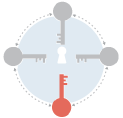BUILD SOCIAL CAPITAL
Identifying and promoting social cohesion within the system
Donor-funded projects are accountable for measurable sector-specific results. SCALE+ specifies indicators to help evaluate progress toward improved stakeholder relationships and increased social capital. Social capital—or the strength of bonds within each group as well as the bridges to other groups within a defined network1—is essential for stimulating collective action within a social system and for sustaining that progress over time.
Following initial mapping of system relationships, a project using SCALE+ launches a major event called a Whole-Systems-in-the-Room (WSR). The WSR begins the process of catalyzing coalitions
and partnerships to integrate the system.
The WSR brings together from 50 to 100 participants from every relevant sector and viewpoint. Its first task is a large-scale, participatory mapping of the specific issue or problem, which adds significant depth to the preliminary work done by project staff. The experience is designed to stimulate shared understanding of the present system and a vision of change, including consensus on common goals. The WSR challenges stakeholders to define a limited number of goals with objectives that all can agree on despite their different interests and agendas. They are also challenged to commit to both individual and organizational 100-day (three months) and 1,000-day (three years) actions to support these goals. Although these actions may be modest, stakeholders must use their own resources. Most importantly, participants also agree on collaborative actions to reach the consensus goals. Agreed-on goals and the pledged actions become the basis for a preliminary project “work plan” that is documented and shared.
Establishing common goals allows stakeholders to invest more fully in actions that complement the actions of other participants. It allows them to commit with the assurance that they are more likely to succeed because other groups are committing responsibly as well. Stating intentions in such a forum also plants the seeds of accountability.
CATALYZE COLLABORATION
Increasing connections, maintaining communication
Voluntary Task Forces are formed at the end of the WSR around each of the consensus goals. These Task Forces take responsibility for meeting regularly to refine plans and carry out agreed-on activities. The project team or Systems Integration Team (SIT) and Cross-Sector Advisory Committee monitors progress of the Task Forces. To stimulate momentum and the sense of shared accountability for goals, staff encourages continuous communication about efforts and successes.
KEEPING IT NEUTRAL FOR EFFECTIVE MANAGEMENT
Commit to common goals
The Systems Integration Team serves management and donors by handling many of the tasks related to partnership coordination and relationship building. The SIT remains “neutral” while facilitating the flow of information among sometimes competitive stakeholders representing diverse interests and agendas. Team members maintain contact on a weekly basis with all stakeholders and assist them in organizing events, sharing information, and remaining focused on their commitments to collaborative actions. In this way they also support and promote accountability for meeting pledged targets. Sharing and even publicizing the fulfillment of these promises helps build collective enthusiasm and momentum.
Later, they continuously provide a macro-level scan of system movements—“finger-on-the-pulse” daily updates on stakeholder relations. The System Integration Team monitors linkages (bridges and bonds) among key stakeholders, assesses the strength of coalitions that are forming and monitors the completion and success of collaborative actions.
